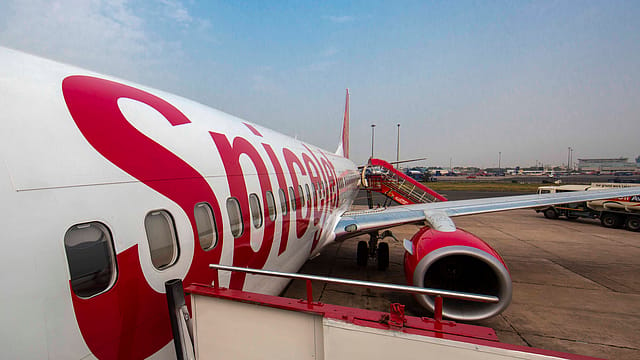SpiceJet raises airfares by up to 15% on high ATF prices, weak rupee
ADVERTISEMENT

Budget career SpiceJet is planning to raise fares by 10-15% in the wake of the rising cost of operations due to high aviation fuel prices and a weak rupee. SpiceJet, in a statement issued today, says the company has absorbed the rising cost of fuel in the past few months, despite a 120% rise in its price since June 2021.
Ajay Singh, chairman and managing director, SpiceJet, has urged state governments as well as the Centre to cut taxes on aviation turbine fuel (ATF), which in India, he says, are the highest.
“Aviation turbine fuel prices have increased by more than 120% since June 2021. This massive increase is not sustainable and governments, central and state, need to take urgent action to reduce taxes on ATF that are amongst the highest in the world. We have in the last few months tried to absorb as much burden of this fuel price rise, which constitutes more than 50% of our operational cost, as we could," says Singh.
Jet fuel or aviation turbine fuel (ATF) prices reached an all-time high after oil marketing companies raised prices by 16% today. This is the steepest ever rise in ATF rates. As per a notification by fuel retailers, the ATF prices have been raised by ₹19,757.13 per kilolitre or 16.26 per cent to ₹1,41,232.87 per kl (₹141.2 per litre) in Delhi-NCR. These prices, however, vary from state to state due to local taxes.
The SpiceJet MD says the weakening of the Indian rupee against the US dollar has further significantly impacted airlines as their substantial cost is either dollar-denominated or pegged to the dollar.
"The sharp increase in jet fuel prices and the depreciation of the rupee have left domestic airlines with little choice but to immediately raise fares and we believe that a minimum 10-15% increase in fares is required to ensure that cost of operations are better sustained,” he adds.
The low-cost airline's stock is trading 6.36% down at ₹41.2 as compared to the previous session close of ₹44 on the National Stock Exchange (NSE). The stock opened down at ₹43 today and touched the intra-day low of ₹40.90, marginally up from its 52-week low of ₹40.85. Meanwhile, the share of the rival and industry leader IndiGo is also trading 4.49% or 76.5 points down.
The rupee is at its lowest level against the U.S. dollar amid persistent fund outflows by foreign investors and weakness in the equity market. Earlier this week, it hit an all-time low of 78.28 against the US dollar, recording a 5% decline against USD this year alone.
The fall in the rupee comes as Indian equity benchmarks – the Sensex and the Nifty 50 – record continuous declines. Today, the BSE Sensex benchmark has fallen 976.76 points, while the Nifty 50 has dropped 304.55 points to 15,387.
Ratings agency ICRA has maintained its “negative” outlook on the Indian aviation industry. While some airlines have adequate liquidity from a strong parent, for others, the credit metrics and liquidity profile remain under significant stress over the past few years. It has cautioned that rising aviation turbine fuel (ATF) prices and a general inflationary environment continue to dampen the industry earnings. “Elevated ATF prices aggravated by geo-political issues will remain a near-term challenge for the industry and will continue to weigh on the profitability of Indian carriers," it says.